外研版小学三年级英语下册知识点归纳
- 格式:docx
- 大小:21.94 KB
- 文档页数:32
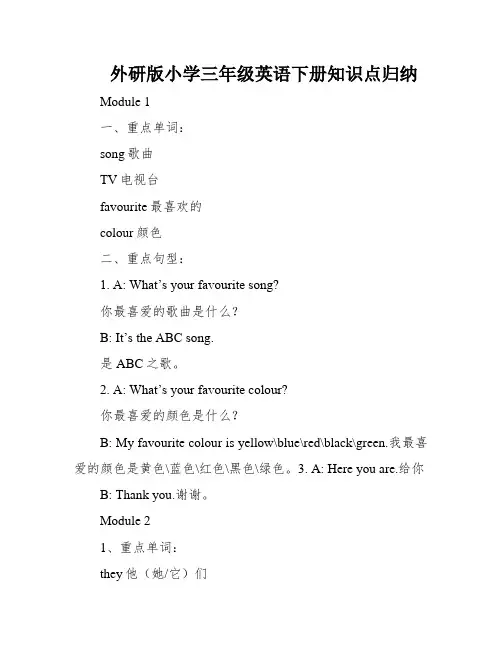
外研版小学三年级英语下册知识点归纳Module 1一、重点单词:song歌曲TV电视台favourite最喜欢的colour颜色二、重点句型:1. A: What’s your favourite song?你最喜爱的歌曲是什么?B: It’s the ABC song.是ABC之歌。
2. A: What’s your favourite colour?你最喜爱的颜色是什么?B: My favourite colour is yellow\blue\red\black\green.我最喜爱的颜色是黄色\蓝色\红色\黑色\绿色。
3. A: Here you are.给你B: Thank you.谢谢。
Module 21、重点单词:they他(她/它)们they're=they are他(她/它)们是monkey山公baby幼兽,幼畜all每个;全体zoo植物园tiger山君lion狮子elephant大象fat胖的man人,男人short矮的tall高的small小的thin瘦的big大的2、重点句型:1. A: What’s this?这个是什么?B: It’s a tiger\ lion\monkey\panda\an elephant.它是一只老虎\狮子\猴子\熊猫\大象。
2. A: What are they?它们是甚么?B: They’re tigers\lions\monkeys\pandas\elephants.它们是老虎\狮子\猴子\熊猫\大象。
3. This man is tall.这个男人是高的。
4. That man is short.那个男人是矮的。
5. This monkey is small and thin.这只山公既小又瘦。
6. That monkey is big and fat.那只山公既大又胖。
Module 3一、重点单词:like喜欢football足球them他(她/它)们ouch哎呦basketball篮球table tennis乒乓球morning exercises早操ride骑bike自行车swim泅水2、重点句型:I like football\ basketball\ table tennis\ morning exercises\ swimming\skipping\ riding bikes.我喜欢足球\篮球\乒乓球\早操\游泳\跳绳\骑自行车。

一、课文内容1. 课文主题:描述日常生活中的活动和事物。
2. 课文故事:通过日常生活场景,如早晨起床、上学放学、在家做什么等,向学生展示了日常生活中常见的活动和事物。
3. 课文语言特点:简单易懂,以日常用语为主,适合三年级学生的学习水平。
二、单词和词组1. 本单元主要单词:morning, afternoon, evening, wake up, brush teeth, have breakfast, go to school,e home, do homework, have dinner, go to bed。
2. 本单元重点词组:get up, go to school,e home, do homework, have dinner。
3. 单词和词组练习:学生需要通过游戏、歌曲等形式来记忆和练习,以加深印象。
三、语法知识1. 本单元语法:现在进行时。
2. 语法用法:描述正在进行的动作,如I am brushing my teeth. She is doing her homework.3. 语法训练:通过图片或口头指令,让学生用现在进行时描述图片中的人物正在做的事情,巩固所学的语法知识。
四、听说读写技能1. 听:通过听力练习,让学生能够听懂日常生活中的常见活动和事物的名称。
2. 说:通过口语练习,让学生能够用英语描述自己日常生活中的活动。
3. 读:通过阅读课文和相关练习,让学生掌握本单元的词汇和句型。
4. 写:通过书写练习,让学生能够用英语描述自己的日常生活,并且能够正确使用现在进行时。
五、学习方法1. 多听:通过听力练习,让学生多次听到课文内容和相关单词,以加强记忆。
2. 多说:引导学生多说英语,如用英语描述自己的日常活动。
3. 多读:通过阅读相关练习,让学生熟练掌握本单元的词汇和句型。
4. 多写:通过书写练习,让学生巩固所学的语法知识,提高书面表达能力。
总结:本单元主要内容是描述日常生活中的活动和事物,重点单词和词组包括morning, afternoon, evening, wake up, brush teeth, have breakfast, go to school,e home, do homework, have dinner, go to bed。
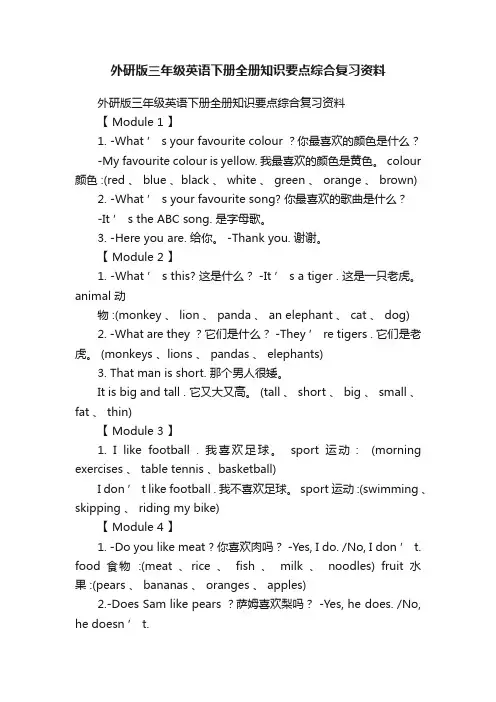
外研版三年级英语下册全册知识要点综合复习资料外研版三年级英语下册全册知识要点综合复习资料【 Module 1 】1. -What ’ s your favourite colour ?你最喜欢的颜色是什么?-My favourite colour is yellow. 我最喜欢的颜色是黄色。
colour 颜色 :(red 、 blue 、black 、 white 、 green 、 orange 、 brown)2. -What ’ s your favourite song? 你最喜欢的歌曲是什么?-It ’ s the ABC song. 是字母歌。
3. -Here you are. 给你。
-Thank you. 谢谢。
【 Module 2 】1. -What ’ s this? 这是什么? -It ’ s a tiger . 这是一只老虎。
animal 动物 :(monkey 、 lion 、 panda 、 an elephant 、 cat 、 dog)2. -What are they ?它们是什么? -They ’ re tigers . 它们是老虎。
(monkeys 、lions 、 pandas 、 elephants)3. That man is short. 那个男人很矮。
It is big and tall . 它又大又高。
(tall 、 short 、 big 、 small 、fat 、 thin)【 Module 3 】1. I like football . 我喜欢足球。
sport 运动:(morning exercises 、 table tennis 、basketball)I don ’ t like football . 我不喜欢足球。
sport 运动 :(swimming 、skipping 、 riding my bike)【 Module 4 】1. -Do you like meat ? 你喜欢肉吗? -Yes, I do. /No, I don ’ t. food 食物:(meat 、rice 、fish 、milk 、noodles) fruit 水果 :(pears 、 bananas 、 oranges 、 apples)2.-Does Sam like pears ?萨姆喜欢梨吗? -Yes, he does. /No, he doesn ’ t.-Does Amy like pears ? 埃米喜欢梨吗 ? -Yes, she does. /No, she doesn ’ t. food 食物 :(meat 、 rice 、 fish 、 milk 、 noodles ) fruit 水果 :(pears 、bananas 、oranges 、 apples)3. -Pass me the rice, please! 请递给我米饭。
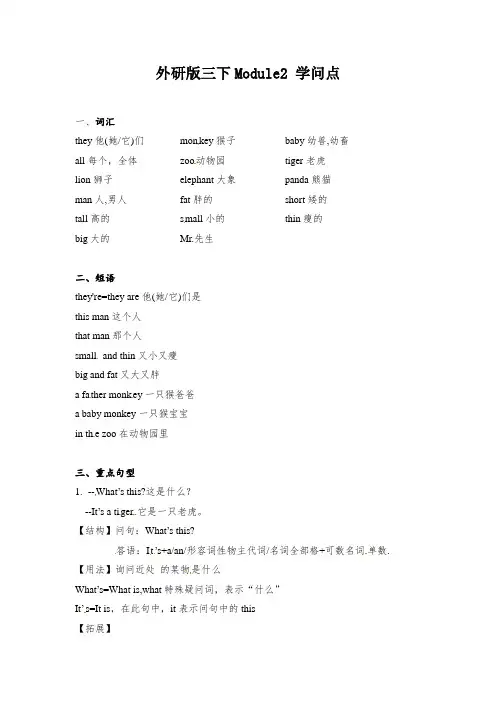
外研版三下Module2 学问点一、词汇they他(她/它)们mon key猴子baby幼兽,幼畜all每个,全体zoo动物园tiger老虎lion狮子elephant大象panda熊猫man人,男人fat胖的short矮的tall高的s mall小的thin瘦的big大的Mr.先生二、短语they're=they are他(她/它)们是this man这个人that man那个人small and thin又小又瘦big and fat又大又胖a fa ther monk ey一只猴爸爸a baby monkey一只猴宝宝in th e zoo在动物园里三、重点句型1.--What’s this?这是什么?--It’s a ti ger.它是一只老虎。
【结构】问句:What’s this?答语:It’s+a/an/形容词性物主代词/名词全部格+可数名词单数. 【用法】询问近处的某物是什么What’s=What is,what特殊疑问词,表示“什么”It’s=It is,在此句中,it表示问句中的this【拓展】(1)it的用法①it可用来代替指示代词this/that例如:--Wh at’s that?--It is a cat.②表示时间、距离、天气、数字等例如:--What’s the time?--It is seven o’clock.③用来代替前面提到的物品例如:Linda has a new toy. It i s beauti ful.④在接打电话中,it可用来指代对方或自己例如:--Hello! Who is it?--It’s Tina.(2)this(这,这个)的反义词是that(那,那个)What’s that?那是什么?用来询问远处的某物是什么2.--What are they?它们是什么?--They’re lions.它们是狮子。
【结构】问句:What are they?答语:They are+可数名词复数.当主语是两个及以上的事物时,be动词用areThey’re=They are例句:--What are they?它们是什么?--They are monkeys.它们是猴子。
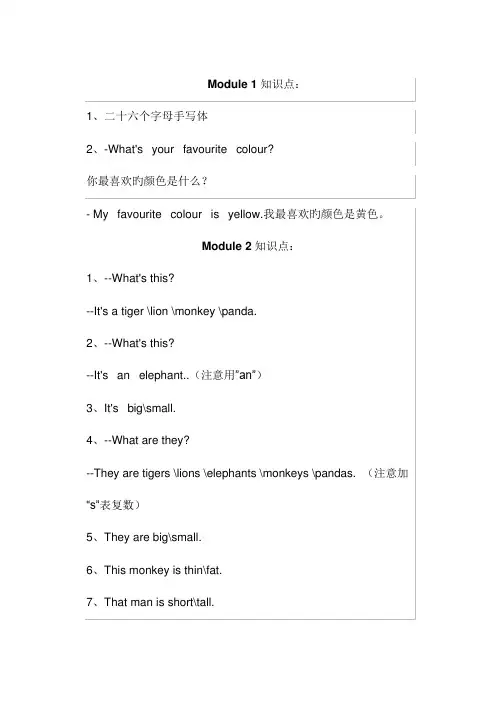
Module 1知识点:1、二十六个字母手写体2、-What's your favourite colour?你最喜欢旳颜色是什么?- My favourite colour is yellow.我最喜欢旳颜色是黄色。
Module 2知识点:1、--What's this?--It's a tiger \lion \monkey \panda.2、--What's this?--It's an elephant..(注意用”an”)3、It's big\small.4、--What are they?--They are tigers \lions \elephants \monkeys \pandas. (注意加“s”表复数)5、They are big\small.6、This monkey is thin\fat.7、That man is short\tall.Module 3知识点:1、I like football\basketball\table tennis\morning exercises.2、I don't like swimming\riding bikes\skipping.3、--Do you like football?--Yes, I do. --No, I don't.1)说“我喜欢……”用句子“I like…”2) 说“我不喜欢……”用句子“I don't like…”3)问“你喜欢……吗?”用句子“Do you like…?”喜欢旳话,回答“Yes, I do.”不喜欢旳话,回答“No, I don't ”Module 4知识点:1、--Do you like rice\noodles\meat\fish?--Yes, I do. --No, I don't.2、--Does Daming like bananas\oranges\apples?--Yes, he does. --No, he doesn't.*********************************1)第三人称单数(简称“三单”)意思为“tā”,包括he、she、称呼和名字。
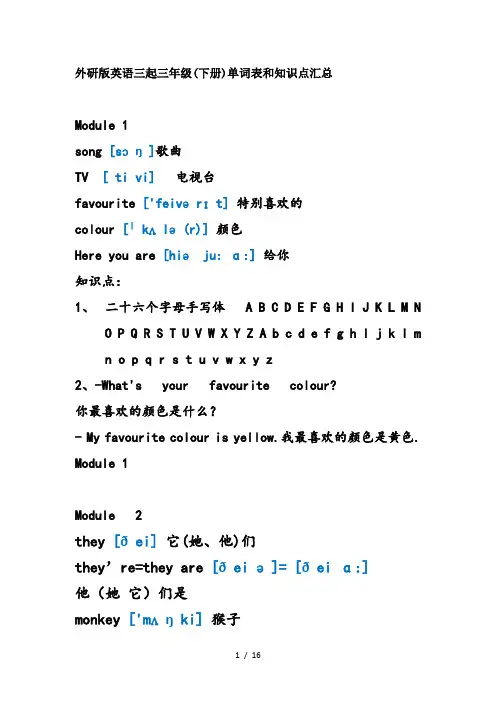
外研版英语三起三年级(下册)单词表和知识点汇总Module 1song [sɔŋ]歌曲TV [ ti vi]电视台favourite ['feivərɪt]特别喜欢的colour [ˈkʌlə(r)]颜色Here you are [hiə ju: ɑ:]给你知识点:1、二十六个字母手写体 A B C D E F G H I J K L M NO P Q R S T U V W X Y Z A b c d e f g h I j k l m n o p q r s t u v w x y z2、-What's your favourite colour?你最喜欢的颜色是什么?- My favourite colour is yellow.我最喜欢的颜色是黄色. Module 1Module 2they [ðei]它(她、他)们they’re=they are [ðei ə]= [ðei ɑ:]他(她它)们是monkey ['mʌŋki] 猴子baby ['beɪbɪ]幼兽幼畜婴儿all[英][ ɔ: l] 每个全体zoo[zu:] 动物园tiger ['taigə] 老虎lion ['laiən] 狮子elephant ['elifənt]大象small [smɔ:l] 小的fat [fæt] 胖的man [man] 人男人short [ʃɔ:t]矮的tall [tɔ:l]高的small [smɔ:l]小的short [ʃɔ:t] 矮的thin [θin]瘦的big [big]大的知识点:1、--What's this? 这是什么?--It's a tiger /lion /monkey/ panda. 它是一只老虎/狮子/猴子/熊猫.2、--What's this? 这是什么?--It's an elephant.(注意用”an”)它是一只大象.3、It's big/small.它很大/很小.4、--What are they? 它们是什么?--They are tigers /lions/ elephants/ monkeys /pandas. (注意加“s”表复数)它们是老虎/狮子/大象/猴子/熊猫.5、They are big/small. 它们很大/很小.6、This monkey is thin/fat.这只猴子很瘦/很胖.7、That man is short/tall.那个人很矮/很高.MODULE 3like [laik]喜欢football ['futbɔ:l]足球them[英][ðəm]它(她、他)们ouch英][aʊtʃ]哎呦basketball ['bɑ:skit,bɔ:l] 篮球table tennis ['teibl] ['tenis]乒乓球morning exercises [英]['mɔ:nɪŋ]['eksəsaɪzɪz] 早操bike英][baɪk]swim ['swim]游泳skipp[skip]跳绳知识点:1、I like football/basketball/table tennis/morning exercises. 我喜欢足球/篮球/乒乓/晨练. --She's/He's a doctor/teacher. 她是他是一个医生/老师.2、I don't like swimming/ride bikes/skipping. 我不喜欢游泳/骑自行车/跳绳.*********************************1)说“我喜欢……”用句子“I like…”2) 说“我不喜欢……”用句子“I don't like…”3)问“你喜欢……吗?”用句子“Do you like…?”喜欢的话;回答“Yes, I do.”不喜欢的话;回答“No, I don't ”MODULE 4meat [mi:t]肉pass [pɑ:s]传;递rice [rais]米饭Mum [mʌm]妈妈noodles ['nu:dlz]面条(常复)fish [fiʃ]鱼milk [milk] 牛奶mm [əm]呣does[dʌz] do[du:]的第三人称单数orange ['ɔ:rindʒ] 橘子apple ['æpl]苹果banana [bə'nɑ:nə]香蕉pear [pɛə]梨doesn’t= does not [dʌznt] = [dʌz nɔt]不知识点:1、Do you like rice/noodles/meat/fish. 你喜欢米饭/面条/肉/鱼. --Yes, I do.是的;我是.-No,I don't. 不;我不是的.2、Does Daming like bananas/oranges/apples.达明喜欢香蕉/橘子/苹果.--Yes,he/she does. 是的;他/她是.--No,he/she doesn't.不是;他/她不是的.*********************************1)第三人称单数(简称“三单”)意思为“tā”;包括he、she、称呼和名字.如:Daming, Amy, my sister,your father.2) 说“三单喜欢……”用句子“三单likes…”3) 说“三单不喜欢……”用句子“三单doesn't like…”4)问“三单喜欢……吗?”用句子“Does三单like…?”喜欢的话;回答“ Yes,he/she does. ”不喜欢的话;回答“ No,he/she doesn't. ”MODULE 5goes[gəuz] (go的第三人称单数形式) 去;到go[gəu] to [tu:] school[sku:l]上学on [ɒn]表示位置)在…上; (表示时间)在…之时; (方式)通过Monday [ˈmʌndi][ 星期一play [plei]参加(体育活动比赛等)phone [英][fəʊn ]电话电话机on the phone [ɒn] [ðə] ][fəʊn ]通电话with [wiz]与…..在一起同跟和friend [frend]朋友at [æt]在home [həʊm]家at home [æt] [həʊm]在家who [hu:] 谁only [ˈonli]只仅仅year [jə:]年龄岁数work [wɜ:k]工作地点go to work [gəu] [tu:] [wɜ:k] 上班Saturday [ˈsætədeɪ] 星期六shopping ['ʃɒpɪŋ]购物go shopping [gəu] ['ʃɒpɪŋ]去购物dad [dæd]爸爸知识点:1、Amy goes to school on Mondays.艾米星期一上学.2、Tom doesn't go to school on Mondays. 汤姆星期一不去学校我.3、Does your mother go shopping on Saturdays?你妈妈星期六去购物吗?--Yes,she does.是的;她要去.--No,she doesn't.不;她不去.*********************************1) 说“三单做……”用句子“三单 + 动词s…”2) 说“三单不做……”用句子“三单 + doesn't 动词原形…”3) )问“三单做……吗?”用句子“Does三单 + 动词原形…?”肯定回答“ Yes,heshe does. ”否定回答“ No,heshe doesn't.”*********************************1)说“其他人称做……”用句子“其他人称 + 动词原形…”2) 说“其他人称不做……”用句子“其他人称 + don't 动词原形…”3) )问“其他人称做……吗?”用句子“Do 其他人称 + 动词原形…?”肯定回答“ Yes,其他人称do. ”否定回答“ No,其他人称 don't.”MODULE 6do [du:]做Sunday [英][ˈsʌndeɪ]星期日Swimming [英][ˈswɪmɪŋ] 游泳go swimming [gəu] ][ˈswɪmɪŋ] 去游泳eat [i:t]吃in [ɪn]在…..期间在…..时候sleep [sli:p]睡觉watch [英][wɒtʃ]观看TV[ ti:vi]电视watch TV [wɒtʃ] ti:vi]看电视have [hæv]有class [klɑ:s]课班级today [tə'deɪ]今天Music ['mju:zik] 音乐has [hæz] (have 的第三人称单数形式) 做进行从事Chinese ['tʃai'ni:z]语文;汉语Maths [mæθs]数学Art [ɑ:t] 美术PE[,pi:' i:]体育Science ['saiəns]科学知识点:1、--Do you go swimming on Mondays? 你星期一去游泳吗?--No, I don't.不;我不游泳.*2、--What do you do in the afternoon?你下午做什么?--I watch TV in the afternoon.我下午看电视.*3、--What do you have in the morning?你上午上什么课?--I have Chinese in the morning.我上午上语文课.*4、--What does Xiaoyong have in the afternoon?小勇下午上什么课?--He has music in the afternoon.他下午上音乐课.*********************************have +学科上……课have Chinese /maths /science/ art /PE上语文/数学/科学/美术/体育课play +球类打……球play football/basketball/table tennis踢足球;打篮球;打乒乓球in the morning/afternoon在上午/下午MODULE 7we [wɪ]我们fly [flaɪ]放(风筝)spring [sprɪŋ]春天summer ['sʌmə(r)]夏天season [ˈsi:zn]季节nice [英][naɪs]迷人的令人愉快的warm [wɔ:m]暖和的hot[英][hɒt]热的autumn ['ɔ:təm]秋天cool[ku: l] 凉爽的winter ['wintə]冬天cold [kəuld]寒冷的sunny ['sʌni]晴朗的;阳光充足的windy ['windi]有风的very [veri] 很非常知识点:1、It's + 天气.It's warm/hot/cool/cold today. 今天天气很暖和/热/凉爽/冷It's sunny/windy.晴朗天/有风天2、We fly kites in spring.我们春天放风筝.3、We go swimming in summer.我们夏天游泳.4、We play football in autumn.我们秋天踢足球.5、We go skating in winter.我们冬天滑冰.6、What do you do in spring/summer/autumn/winter? 春(夏秋冬)季你(们)做什么?7、Spring is my favourite season.春季是我最喜欢的季节.MODULE 8toy [tɔi]玩具under['ʌndə]在……下面for [fɔ:]为给box[bɔks]盒子behind [bhaind]在….后面bedroom['bedru:m]卧室fly [flaiz]( fly的第三人称单数形式) 放(风筝)park[pɑ:k]公园lake[leik]湖tree [tri:]树fishing [fiʃiŋ]捕鱼钓鱼go fishing [gəu] [fiʃiŋ] 去钓鱼walk[wɔ:k]步行知识点:1、Where 's the toy?玩具在哪里?It 's behind the door.它在门后.It 's under your chair.它在你的椅子下面.2、The dog is in the lake.狗在湖里3、In spring,Daming files a kite in the park.春天;大明在公园放风筝.4、In autumn,he goes fishing under the tree.秋天;他在树下钓鱼.MODULE 9have got [hæv] [gɔt]拥有(have got的第三人称单数形式)sweater['swetə]毛线衫bed [bed] 床line [lain]线about [ə'baut]关于animal['æniməl]动物sport[spɔ:t]运动haven’t(got)=have not(got) [hævnt]=[hæv nɔt] 没有dress[dres]连衣裙;女装coat[kəut]外套T-shirt['ti:,ʃə:t] T恤衫has got [hæz] [gɔt]拥有(have got的第三人称单数形式)hasn’t(got)=has not(got) [hæznt]=[hæs nɔt]没有by[bai]乘坐;以……方式bus[bʌs]公共汽车car [kɑ:] 小汽车知识点:1、I've got a new book.我有一本新书.2、I haven't got a new sweater.我没有一件新毛线衫.3、--Have you got a new sweater?你有一件新毛线衫吗?--Yes, I have.是的;我有.4、Mr Smart has got a car. 斯马特先生有一辆小汽车.5、She hasn't got a kite.她没有风筝.6、--Has Amy got a bike?艾米有一辆自行车吗?--No,she hasn't.不;她没有.7、She goes to school by bus/car/bike.她乘公共汽车/开小车/骑自行车去上学.8、My father goes to work by bus.我父亲乘公共汽车去上班.*********************************1)、说“我有一个……”用句子“I've got a …”2)、说“我没有一个……”用句子“I haven't got a …”3)问“你有……吗?”用句子“Have you got a …?”有的话;回答“Yes, I have.”没有的话;回答“No, I haven't.”$$$知识点1—3抓住关键词“have”!!!*********************************4)、说“三单有一个……”用句子“三单has got a…”5)、说“三单没有一个……”用句子“三单hasn't got a…”6)、问“三单有一个……吗?”用句子“Has三单got a…? ”有的话;回答“Yes,he/she has.”没有的话;回答“No, he/she hasn't. $$$知识点4—6抓住关键词“has”!!!!MODULE 10hat[hæt]帽子[kʌm]来back [bæk]回到返回[kʌm] [bæk]回来clothes [kləuðz](常复) 衣服open[əupen]打开let’s=let us [lets]=[let ʌs]让我们put on [put] [ɔn]穿上funny [fʌni]滑稽的party [pʌti]聚会OK [əuki]好的brown[braʊn]褐色的棕色的trousers[traʊzəz] (常复)裤子orange ['ɔ:rindʒ] 橙色的橘黄色的shirt [ʃə:t]衬衫look at [lu:k] [æt]看朝…..看shoe [ʃ u:]鞋can’t=can not [kænt]=[kan nɔt]不会turn [t ə:n](多人一次轮流时)轮到的机会white [wait] 白色photo [fəutəu]照片skirt[sk ə:t]女裙裙子知识点:1、I've got funny trousers.我有条滑稽的裤子.2、Here's a/an…这儿有……Here's a black hat.这儿有一个黑色的帽子.Here's an orange hat. 这儿有一个橙色的帽子. 3、--Has she got an orange sweater?她有一件橙色的毛衣吗?--Yes,she has.是的;她有.--No,she hasn't.不;她没有.4、使用an表示一个的情况:an apple一个苹果an elephant 一头大象an orange 一个橘子an orange sweater 一件橘红色的毛衣。
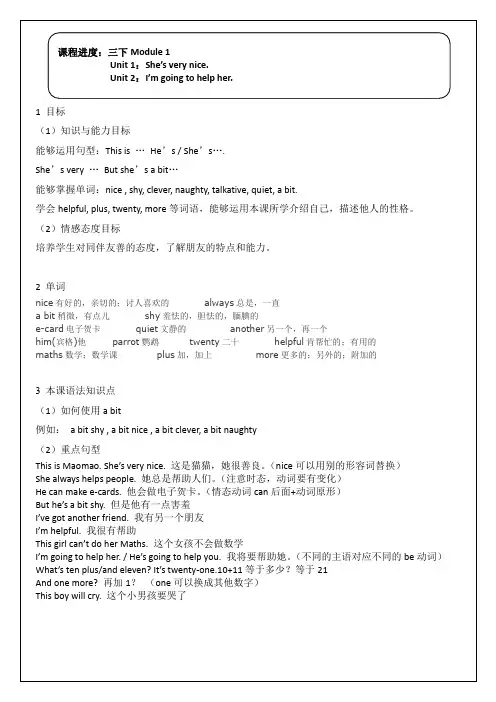
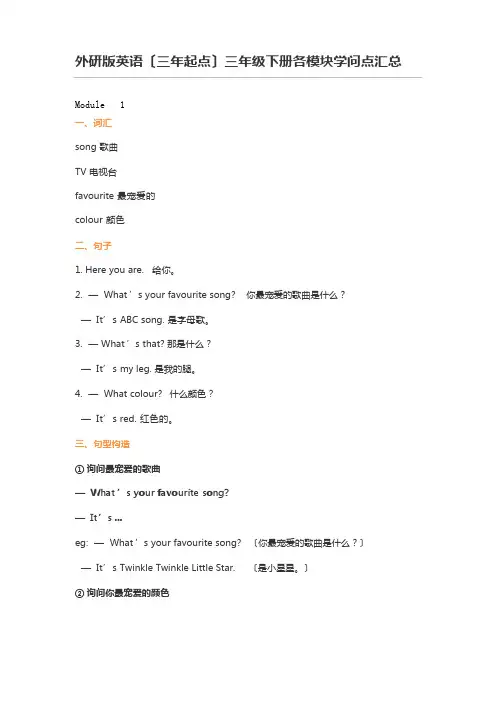
外研版英语〔三年起点〕三年级下册各模块学问点汇总Module 1一、词汇song 歌曲TV 电视台favourite 最宠爱的colour 颜色二、句子1.Here you are. 给你。
2.—What ’s your favourite song? 你最宠爱的歌曲是什么?—It’s ABC song. 是字母歌。
3.— What ’s that? 那是什么?—It’s my leg. 是我的腿。
4.—What colour? 什么颜色?—It’s red. 红色的。
三、句型构造① 询问最宠爱的歌曲—What ’s your favourite song?—It’s ...eg:—What ’s your favourite song? 〔你最宠爱的歌曲是什么?〕—It’s Twinkle Twinkle Little Star. 〔是小星星。
〕② 询问你最宠爱的颜色—What ’s your favourite colour? 〔你最宠爱的颜色是什么?〕—It’s + 颜色词.eg:—What ’s your favourite colour? 〔你最宠爱的颜色是什么?〕—It’s green. 〔是绿色。
〕③ 询问那是什么—What ’s that?—It’s ...eg: — What ’s that? 〔那是什么?〕—It’s my book. 〔是我的书。
〕四、英文字母Module 2一、词汇they 他〔她/它〕们they ’re = they are 他〔她/它〕们是monkey 猴子baby 幼兽,幼畜all 每个;全体zoo 动物园tiger 老虎lion狮子elephant大象fat 胖的man 人,男人short 矮的tall高的small 小的thin 瘦的big 大的二、句子1.— What ’s this? 〔这是什么?〕—It’s a tiger. 〔它是只老虎。
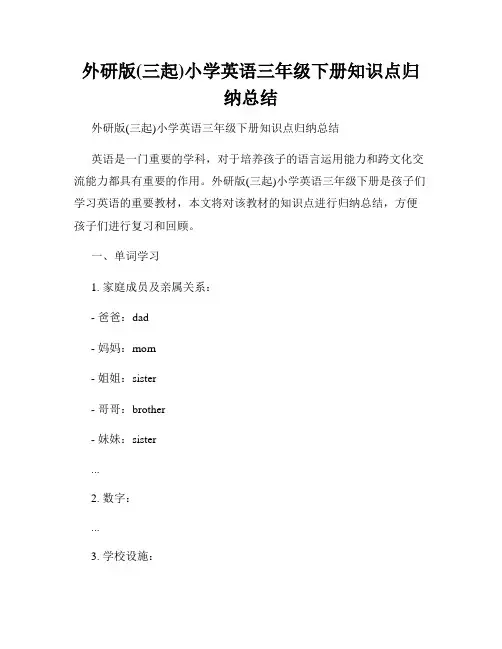
外研版(三起)小学英语三年级下册知识点归纳总结外研版(三起)小学英语三年级下册知识点归纳总结英语是一门重要的学科,对于培养孩子的语言运用能力和跨文化交流能力都具有重要的作用。
外研版(三起)小学英语三年级下册是孩子们学习英语的重要教材,本文将对该教材的知识点进行归纳总结,方便孩子们进行复习和回顾。
一、单词学习1. 家庭成员及亲属关系:- 爸爸:dad- 妈妈:mom- 姐姐:sister- 哥哥:brother- 妹妹:sister...2. 数字:...3. 学校设施:...4. 动物:...二、语法学习1. 句型- 主语+动词- 主语+be动词+形容词2. 疑问句- 一般疑问句:动词/动词短语+主语?- 特殊疑问句:疑问词+一般疑问句三、句子构成1. 基本句型- I am a student.- She is my sister.2. 特殊句型- What's your name?- How old are you?四、情境会话1. 问候与介绍- Hello, good morning/afternoon/evening.- What's your name?- My name is...2. 日常生活用语- Thank you/You're welcome.- See you later.五、阅读理解1. 阅读文章并回答问题- 根据文章内容回答问题。
六、综合练习1. 完成句子- 根据图片或提示补全句子。
2. 选择正确答案- 根据问题选择适当的答案。
以上是对外研版(三起)小学英语三年级下册的知识点进行的归纳总结,通过复习这些知识点,帮助孩子们巩固已学知识,提高英语表达能力和语言理解能力。
希望孩子们能够在学习英语的过程中不断进步!。
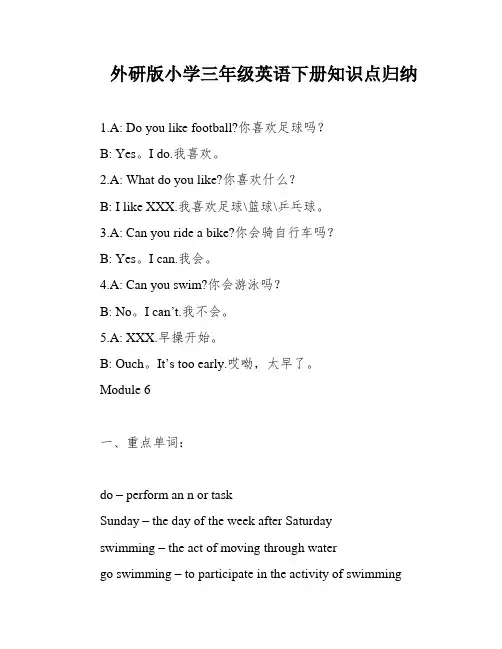
外研版小学三年级英语下册知识点归纳1.A: Do you like football?你喜欢足球吗?B: Yes。
I do.我喜欢。
2.A: What do you like?你喜欢什么?B: I like XXX.我喜欢足球\篮球\乒乓球。
3.A: Can you ride a bike?你会骑自行车吗?B: Yes。
I can.我会。
4.A: Can you swim?你会游泳吗?B: No。
I can’t.我不会。
5.A: XXX.早操开始。
B: Ouch。
It’s too early.哎呦,太早了。
Module 6一、重点单词:do – perform an n or taskSunday – the day of the week after Saturdayswimming – the act of moving through watergo swimming – to participate in the activity of swimmingeat – to consume foodin – during a specific d or timesleep – to rest with eyes closed and the body relaxedwatch – to observe or look at somethingwatch TV – to observe n programminghave – XXXclass – a group of students who are XXXtoday – the present daymusic – the art of arranging XXXhas – the third person singular form of “have”Chinese – the language XXXmaths – the study of numbers。
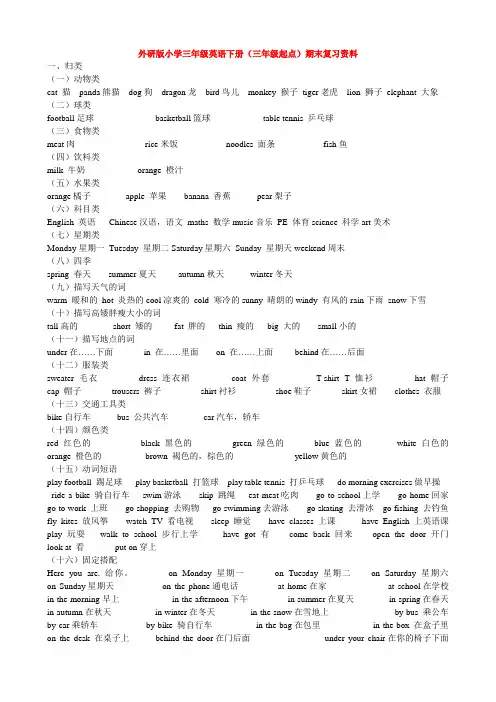
外研版小学三年级英语下册(三年级起点)期末复习资料一、归类(一)动物类cat 猫panda熊猫dog狗dragon龙bird鸟儿monkey 猴子tiger老虎lion 狮子elephant 大象(二)球类football足球basketball篮球table tennis 乒乓球(三)食物类meat肉rice米饭noodles 面条fish鱼(四)饮料类milk 牛奶orange 橙汁(五)水果类orange橘子apple 苹果banana 香蕉pear梨子(六)科目类English 英语Chinese汉语,语文maths 数学music音乐PE 体育science 科学art美术(七)星期类Monday星期一Tuesday 星期二Saturday星期六Sunday 星期天weekend周末(八)四季spring 春天summer夏天autumn秋天winter冬天(九)描写天气的词warm 暖和的hot 炎热的cool凉爽的cold 寒冷的sunny 晴朗的windy 有风的rain下雨snow下雪(十)描写高矮胖瘦大小的词tall高的short 矮的fat 胖的thin 瘦的big 大的small小的(十一)描写地点的词under在……下面in 在……里面on 在……上面behind在……后面(十二)服装类sweater 毛衣dress 连衣裙coat 外套T-shirt T 恤衫hat 帽子cap 帽子trousers 裤子shirt衬衫shoe鞋子skirt女裙clothes 衣服(十三)交通工具类bike自行车bus 公共汽车car汽车,轿车(十四)颜色类red 红色的black 黑色的green绿色的blue 蓝色的white白色的orange 橙色的brown 褐色的,棕色的yellow黄色的(十五)动词短语play football 踢足球play basketball 打篮球play table tennis 打乒乓球do morning exercises做早操ride a bike 骑自行车swim游泳skip 跳绳eat meat吃肉go to school上学go home回家go to work 上班go shopping 去购物go swimming去游泳go skating 去滑冰go fishing 去钓鱼fly kites 放风筝watch TV看电视sleep睡觉have classes 上课have English上英语课play 玩耍walk to school步行上学have got 有come back回来open the door开门look at 看put on穿上(十六)固定搭配Here you are. 给你。
新标准外研社三起点小学英语三年级下册知识点Module1- Module2 一、重点单词1. 动物:monkey 猴子 tiger 老虎 lion 狮子 elephant 大象 panda 熊猫2. 形容词:big 大的 small 小的 fat 胖的 thin 瘦的 tall 高的 short 矮的 favourite 最喜爱的二、重点句子1. -What’s your favourite song 你最喜欢什么歌-It’s the ABC song. 是字母歌。
2. -What’s your favourite colour 你最喜欢什么颜色-It’s yellow. 是黄色。
3. -What’s your favourite colour 你最喜欢什么颜色-My favourite colour is yellow。
我最喜欢的颜色是黄色。
4、-What’s your favourite letter 你最喜欢什么字母- My favourite letter is Jj.我最喜欢字母Jj.5、-What’s your favourite animal 你最喜欢什么动物- My favourite animal is the cats.我最喜欢动物是猫.6. Here you are 给你。
Thank you. 谢谢。
7. ①-What’s this 这是什么- It’s an elephant. 它是一头大象。
②-What's that那是什么 -It's a lion.它是一头狮子。
8、①-What are they 它们是什么-They’re monkeys. 它们是猴子。
②-What are they 它们是什么-They’re boys.. 它们是男孩。
9. This monkey is small and thin. 这只猴子又小又瘦。
10. That monkey is big and fat. 那只猴子又大又胖。
外研版三下Module4 学问点一、词汇meat肉rice米饭noodles(常复)面条fish鱼肉;鱼milk牛奶orange橙;柑;橘apple苹果banana香蕉pear梨pass传,递mum妈妈but但是Yellow黄色blue蓝色green绿色ginger姜does do的第三人称单数形式doesn't=does not不二、短语pass me the rice递给我米饭here you are给你Thank you感谢你三、重点句型1.--Do you like meat, Linglin g?玲玲,你宠爱肉吗?--Yes, I do.是的,我宠爱。
【结构】问句:Do you like+某物?回答:确定回答:Yes, I/we do.否定回答:No, I/we don’t.--Does Lingling like oranges?玲玲宠爱橙子吗?--Yes, she does.是的,她宠爱。
【结构】问句:Does+主语(第三人称单数)like+某物?回答:确定回答:Yes, he/she does.否定回答:No, he/she doesn’t.问句中的do是助动词,没有实际意义,放在句首挂念构成一般疑问句。
like,动词,宠爱,后面加可数名词复数或不行数名词例句:--Do you like fish?你宠爱鱼肉吗?--No, I don’t.不,我不宠爱。
【拓展】助动词do的人称变化(1)谓语是实义动词的一般现在时的一般疑问句中,主语为第三人称单数时,助动词要用does;(否定形式为does not,缩写为doesn’t)(2)主语不是第三人称单数时,助动词要用do,(否定形式为do not=do n’t)【语法学问】一般现在时的陈述句变一般疑问句的规章一般现在时的陈述句变一般疑问句时,依据谓语动词类别的不同大致可以氛围两种状况:(1)当陈述句的谓语动词是be动词或情态动词时,需要把be动词或情态动词提到主语前:如:Are you a teacher?你是老师吗?Can birds fly?鸟会飞吗?(2)当陈述句的谓语动词时实义动词时,需要在主语前加助动词do或does,句中谓语动词要用原形:如:Do you know it?你知道它吗?Does she like apples?她宠爱苹果吗?【词汇拓展】食物篇meat肉rice米饭fish鱼肉noodles面条bread面包meatball肉丸porridge粥cake蛋糕cookies曲奇饼toast吐司pudding布丁panc ake薄饼dumplings饺子sandwich三明治。
新标准外研社三起点小学英语三年级下册知识点Module1- Module2 一、重点单词1. 动物:monkey 猴子tiger 老虎lion 狮子elephant 大象panda 熊猫2. 形容词:big 大的small 小的fat 胖的thin 瘦的tall 高的short 矮的favourite 最喜爱的二、重点句子1. -What’s your favourite song? 你最喜欢什么歌?-It’s the ABC song. 是字母歌。
2. -What’s your favourite colour? 你最喜欢什么颜色?-It’s yellow. 是黄色。
3. -What’s your favourite colour? 你最喜欢什么颜色?-My favourite colour is yellow。
我最喜欢的颜色是黄色。
4、-What’s your favourite letter?你最喜欢什么字母?- My favourite letter is Jj.我最喜欢字母Jj.5、-What’s your favourite animal?你最喜欢什么动物?- My favourite animal is the cats.我最喜欢动物是猫.6. Here you are? 给你。
Thank you. 谢谢。
7. ①-What’s this? 这是什么?- It’s an elephant. 它是一头大象。
②-What's that?那是什么?-It's a lion.它是一头狮子。
8、①-What are they? 它们是什么?-They’re monkeys. 它们是猴子。
②-What are they? 它们是什么?-They’re boys.. 它们是男孩。
9. This monkey is small and thin. 这只猴子又小又瘦。
10. That monkey is big and fat. 那只猴子又大又胖。
小学英语三年级下册重点知识点动物类:monkey tiger lion elephant panda猴子老虎狮子大象熊猫交通工具类:car bike bus小汽车自行车公共汽车形容词:big small fat thin tall short大的小的胖的瘦的高的矮的/短的运动类:football basketball table tennis ride bikes swim skip 足球篮球乒乓球骑自行车游泳跳绳食物类:meat rice noodles fish milk肉米饭面条鱼肉牛奶水果类:banana pear orange apple香蕉梨橘子苹果课程类Chinese Maths Science Music Art PE语文数学科学音乐美术体育季节类spring summer autumn winter春天夏天秋天冬天天气类warm hot cool cold暖和的热的凉爽的冷的sunny windy rainy snowy晴朗的有风的有雨的有雪的衣服类dress coat sweater T-shirt trousers skirt shoes shirt 连衣裙外套毛衣T-恤衫裤子(常复)女裙鞋子衬衫介词:on in under behind在……上面在……里面在……下面在……后面动词——动词第三人称单数like likes 喜欢play plays 玩,参加eat eats 吃sleep sleeps 睡觉ride rides 骑swim swims 游泳skip skips 跳绳have has 做,进行,从事have got has got 有,拥有fly flies 放(风筝)do does 做,干go goes 去,到watch watches 观看动词短语:get up go to school at home on the phone go to work watch TV 起床去上学在家通电话去上班看电视fly kites go shopping go swimming go skating go fishing放风筝去购物去游泳去滑冰去钓鱼ride a bike in the morning/afternoon on Sundays/Mondays/Saturdays骑自行车在早晨/下午在每周日/每周一/每周六have classes have Chinese/English play football in the lake上课上语文/英语踢足球在湖里under the tree behind the door walk to school by car/bus/bike在树下在门后走着去学校乘轿车/公交车/自行车重点句子:1、Pass me the rice,please.请把米饭递给我。
三年级下册英语外研版重点知识归纳
以下是三年级下册英语外研版的一些重点知识归纳:
1. 词汇:掌握课本中出现的常用词汇,包括动物、颜色、数字、食品等主题的词汇。
2. 语法:学习一般现在时的基本句型,如I am、You are、He is、She is 等。
3. 语音:学习字母在单词中的发音,如元音字母a、e、i、o、u的发音规则。
4. 日常用语:掌握课本中出现的日常用语,如问候、介绍、请求等交际用语。
5. 文化知识:了解英语国家的文化背景,如节日、饮食、生活习惯等,提高跨文化交际意识。
为了帮助孩子们更好地掌握这些重点知识,建议家长和孩子一起制定学习计划,督促孩子按时完成学习任务。
同时,可以结合课本内容,通过听录音、看视频、做练习等方式,全面提高孩子的英语能力。
外研版(三起)小学英语三年级下册知识点归纳总结Module 1一、单词song 歌曲TV 电视台favourite 最喜欢的colour 颜色Here you are. 给你。
二、句子1. Here you are. 给你。
2. —What’s your favourite song? 你最喜欢的歌曲是什么?—It’s ABC song. 是字母歌。
3. —What’s that? 那是什么?—It’s my leg. 是我的腿。
4. —What colour? 什么颜色?—It’s red. 红色的。
三、句型结构①询问最喜欢的歌曲—What’s your favourite song?—It’s ...eg: —What’s your favourite song?(你最喜欢的歌曲是什么?)—It’s Twinkle Twinkle Little Star. (是小星星。
)②询问你最喜欢的颜色—What’s your favourite colour? (你最喜欢的颜色是什么?)—It’s + 颜色词.eg: —What’s your favourite colour? (你最喜欢的颜色是什么?)—It’s green. (是绿色。
)③询问那是什么—What’s that?—It’s ...eg: —What’s that? (那是什么?)—It’s my book. (是我的书。
)四、英文字母Module 2they 他(她/它)们they’re = they are 他(她/它)们是monkey 猴子baby 幼兽,幼畜all 每个;全体zoo 动物园tiger 老虎lion 狮子elephant 大象fat 胖的man 人,男人short 矮的tall 高的small 小的thin 瘦的二、句子1. —What’s this? (这是什么?)—It’s a tiger. (它是只老虎。
)2. —What are they? (它们是什么?)—They’re monkeys.(它们是猴子。
外研版小学三年级英语下册知识点归纳Module 1一、重点单词:song 歌曲TV 电视台favourite 最喜欢的colour 颜色二、重点句型:1. A: What’s your favourite song?你最喜爱的歌曲是什么?B: It’s the ABC song.是ABC 之歌。
2. A: What’s your favourite colour?你最喜爱的颜色是什么?B: My favourite colour is yellow\blue\red\black\green.我最喜爱的颜色是黄色\蓝色\红色\黑色\绿色。
3. A: Here you are. 给你B: Thank you.谢谢。
Module 2一、重点单词:they 他(她/它)们they're=they are 他(她/它)们是monkey 猴子baby 幼兽,幼畜all 每个;全体zoo 动物园tiger 老虎lion 狮子elephant 大象fat 胖的man 人,男人short 矮的tall 高的small 小的thin 瘦的big 大的二、重点句型:1. A: What’s this? 这个是什么?B: It’s a tiger\ lion\monkey\panda\an elephant.它是一只老虎\狮子\猴子\熊猫\大象。
2. A: What are they? 它们是什么?B: They’re tigers\lions\monkeys\pandas\elephants.它们是老虎\狮子\猴子\熊猫\大象。
3. This man is tall.这个男人是高的。
4. That man is short.那个男人是矮的。
5. This monkey is small and thin.这只猴子既小又瘦。
6. That monkey is big and fat.那只猴子既大又胖。
Module 3一、重点单词:like 喜欢football 足球them 他(她/它)们ouch 哎呦basketball 篮球table tennis 乒乓球morning exercises 早操ride 骑bike 自行车swim 游泳二、重点句型:I like football\ basketball\ table tennis\ morning exercises\ swimming\ skipping\ riding bikes.我喜欢足球\篮球\乒乓球\早操\游泳\跳绳\骑自行车。
I don’t like football\ basketball\ table tennis\ morning exercises\ swimming\ skipping\ riding bikes.我不喜欢足球\篮球\乒乓球\早操\ 游泳\跳绳\骑自行车。
Module 4一、重点单词:meat 肉pass 传递rice 米饭;米mum 妈妈noodles (常复)面条fish 鱼肉;鱼but 但是milk 牛奶mm 呣does do 的第三人称单数形式orange 橙;柑;橘apple 苹果banana 香蕉pear 梨doesn't =does not 不二、重点句型:1. A: Please pass me the rice.请把米饭传递给我。
B: Here you are. 给你。
2. A: Do you like meat\noodles\milk\fish\rice?你喜欢肉\面条\牛奶\鱼肉\米饭吗?B: Yes, I do.\ No, I don’t.是的,我喜欢。
\不,我不喜欢。
3. A: Does Lingling like bananas\pears\oranges\apples?玲玲喜欢香蕉\梨\橘子\苹果吗?B: Yes, she does.\No, she doesn’t.是的,她喜欢。
\不,她不喜欢。
4. A: Does Sam like bananas\pears\oranges\apples?萨姆喜欢香蕉\梨\橘子\苹果吗?B: Yes,he does.\No,he doesn’t.是的,他喜欢。
\不,他不喜欢。
Module 5一、重点单词:goes(go的第三人称单数形式)去,到go to school 上学on 在……的时候;通过……,以……的方式Monday 星期一play 参加(体育活动、比赛等)phone 电话;电话机on the phone 通电话with 与……在一起,同,跟,和friend 朋友at 在……home 家at home 在家who 谁only 只,仅仅year 年龄,岁数work 工作地点go to work 上班Saturday 星期六shopping 购物go shopping 去购物dad 爸爸二、重点句型:1. He\She goes to school on Monday.他\她周一去上学。
2. Tom doesn’t go to school on Mondays.汤姆星期一不去上学。
3. A: Is Amy at home?艾米在家吗?B: Yes,she is.\ No, she isn’t.是的,她在。
\不,她不在。
4. A: Does Tom go to school on Mondays?汤姆星期一去上学吗?B: No, he doesn’t.不,他不去。
5. A: Does your mum go to work on Saturdays?你妈妈周六去上班吗?B: Yes,she does.\No,she doesn’t.是的,她去。
\不,她不去。
6. He plays football on Saturdays.他周六踢足球。
7. The dog likes meat.狗喜欢吃肉。
Module 6一、重点单词:do 做,干Sunday 星期日swimming 游泳(运动)go swimming 去游泳eat 吃in 在……期间,在……时候sleep 睡觉watch 观看TV 电视节目watch TV 看电视have 做;进行,从事class 课;班级today 今天music 音乐has (have的第三人称单数形式)做;进行,从事Chinese 语文,汉语maths 数学art 美术PE=physical education 体育science 科学二、重点句型:1. A: What do you do on Sundays?你星期日做什么?B: I go swimming\watch TV\sleep.我去游泳\看电视\睡觉。
2. A: What do you do in the morning\afternoon?你早晨\下午做什么?B: I go swimming\play football\watch TV\sleep in the morning\afternoon.我早晨\下午去游泳\踢足球\看电视\睡觉。
3. A: What do you have in the morning\afternoon?你早晨\下午在学校学的什么?B: I have English, Chinese, Maths and Science in the morning\afternoon .早晨\下午学的英语,语文,数学还有科学。
4. A: What does Xiaoyong have at school today?小勇今天在学校学什么?B: He has Music, Art and PE.他学音乐,美术还有体育。
Module 7一、重点单词:we 我们fly 放(风筝)spring 春天summer 夏天season 季节nice 迷人的,令人愉快的warm 暖和的hot 热的autumn 秋天cool 凉爽的winter 冬天cold 寒冷的skating 滑冰go skating 去滑冰play 玩,玩耍snow 雪;下雪rain 雨;下雨sunny 晴朗的,阳光充足的windy 有风的,刮风的very 很,非常二、重点句型:1. It’s warm in spring.春天很暖和。
It’s hot in summer.夏天很炎热。
It’s cool in autumn.秋天很凉爽。
It’s cold in winter.冬天很冷。
2. We fly kites in spring.春天我们放风筝。
We go skating in winter.冬天我们去滑冰。
We go swimming in summer.夏天我们去游泳。
We play football in autumn.秋天我们踢足球。
3. A: What do you do in spring?你在春天做什么?B: I fly kites\play football\watch TV in spring.春天我放风筝\踢足球\看电视。
4. It’s warm today,but it’s raining.今天很温暖,但是下雨了。
It’s hot and sunny today.今天炎热晴朗。
It’s cool and windy today.今天凉爽有风。
It’s snowing today. It’s very cold.今天下雪了。
天很冷。
Module 8一、重点单词:toy玩具under 在……下面for 为,给,对box 盒子behind 在……后面bedroom 卧室flies(fly的第三人称单数形式)放(风筝)park 公园lake 湖tree 树fishing 捕鱼,钓鱼go fishing 去钓鱼walk 行走,步行二、重点句型:1. It’s on your desk.它在你的桌子上。
It’s behind the door.它在门后面。
It’s under the chair.它在椅子下面。
It’s in the box.它在盒子里。
2. The panda is in the cap.熊猫在帽子里。
3. In spring, Daming flies a kite in the park.春天里,大明在公园里放风筝。
In summer,he swims in the lake.夏天,他在湖里游泳。
In autumn,he goes fishing under the tree.秋天,他在树下钓鱼。
In winter,he walks in the snow.冬天,他在雪地里步行。
4. A: Where is the apple?苹果在哪里?B: It’s in\on\\under the desk.它在桌子里面\上\下面。